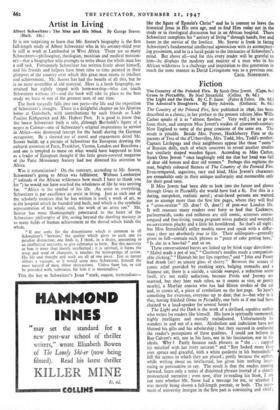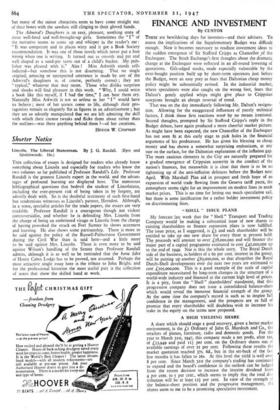Fiction
The Country of the Pointed Firs, first published in 1896, has been described as a classic; in her preface to the present edition Miss Willa Cather speaks of it as " almost flawless." Very well ; let us go on from there, and compare Miss Jewett's studies of nineteenth-century New England to sortie of the great creations of the same era. The result is pitiable. Beside Mrs. Poyser, Huckleberry Finn or the parents of Tess of the d'Urbervilles, Mrs. Todd, Mrs. Todd's mother, Captain Littlepage and their neighbours appear like those " nests " of Russian dolls' each of which unscrews to reveal another smaller but similarly shaped wooden figure. According to Miss Cather, Sarah Orne Jewett " once laughingly told me that her head was full of dear old houses and dear old women." Perhaps this explains the neat, brightly coloured flatness of The Country of the Pointed Firs. Even-tempered, sagacious, racy and kind, Miss Jewett's characters are remarkable only in their antique uniformity and memorable only for their good taste.
If Miss Jewett had been able to look into the future and glance through Grass in Piccadilly she would have had a fit. For this is a daring, outspoken, realistic novel ; strait-laced persons are warned not to attempt more than the first few pages, where they will find a " cross-section " (0, dear! 0, dear!) of post-war London life. It will reassure many readers over forty to find that Cockneys, parlourmaids, cooks and milkmen are still comic, actresses coarse- tongued and free-living, young pregnant wives pathetic and wounded ex-servicemen plucky and a little bit bewildered. So that's all right: but Miss Streatfeild's utility models move and speak with a differ- ence; they are absolutely true to life. Their soliloquies—generally given in full—contain such phrases as " piece of cake getting here," " Is she in a hoo-ha? " and so on.
These conversational bursts are linked up by brisk stage directions : " Mabel made a pot of tea," " Charlotte's needles made a companion- able clicking," " Hannah bit her lips together," and " John and Penny had drank (sic) an uneasy glass of sherry." Between the scenes of comic relief provided by creaking stays, bulging stomachs and a Siamese cat, there is a suicide, a suicide manqué, a seduction scene (well, it's not really seduction, because Freda and Jeremy are married, but they hate each other, so it counts as vice, or pretty nearly), a Mayfair convict who has had fifteen strokes of the cat and, to crown all, a piece of symbolism on the last page. So here's something for everyone, everyone up to date, that is—but why is it that, having finished Grass in Piccadilly, one feels as if one had been chained to a loud-speaker for several hours ?
The Light and the Dark is the work of a civilised, sepsitive author who writes for readers like himself. His hero is spiritually tormented, highly intelligent and morally maladjusted. Unfortunately he wanders in and out of a mist. Alcoholism and indecision have not blurred his gifts and his scholarship ' • but they succeed in confusing the reader's perceptions of these qualities. I could not believe in Roy Calvert's wit, nor in his lusts, nor in his fascination, nor in his ideals. Why ? Partly because- such phrases as " she . . . capped his mischief with her ivory sarcasm " and Roy looked more than ever spruce and graceful, with a white gardenia in his buttonhole " kill the scenes in which they are placed ; partly because the author, while writing about an intellectual, has given him nothing inter- esting or provocative to say. The result is that the reader, craning forward, hears only a series of disjointed phrases instead of a clearly pronounced narrative ; even now, after re-reading his book, I am not sure whether Mr. Snow had a message for me, or whether I was merely being shown a full-length portrait, or both. The treat- ment of university intrigue in the first part is convincing and vivid ;
but many of the minor characters seem to have come straight out of their boxes with the sawdust still clinging to their gloved hands.
The Admiral's Daughters is an easy, pleasant, soothing story of three well-bred and well-brought-up girls. Sometimes the " I " of the narrative seems to come up and whisper in the reader's ear: " It was competent and in places witty and it got a Book Society recommendation. It was one of those novels which never put a foot wrong when one is writing. It turned out as smooth and pat and well shaped as a sand-pie turns out of a child's bucket. My pub- lisher was pleased with it." Alas ! Miss Askwith stands self- indicted—but somehow this is not disarming. That no single original, amusing or unexpected utterance is made by any of the Admiral's daughters is, of course, perfectly correct ; they are " typical," whatever that may mean. Those who dislike surprises and shocks will find pleasure in this work. " Why, I could write a book like this myself, if I had the time," I can hear them cry. Naturally Miss Askwith is not so artless as her " I " would have us believe ; most of her scenes_ come to life, although their pro- tagonists remain as elegantly flat as figures in an advertisement ; but they are so adroitly manipulated that we are left admiring the skill with which their creator tweaks and flicks them about rather than the outlines—was there anything behind them ?—of her creations.
HESTER W. CHAPMAN



































 Previous page
Previous page